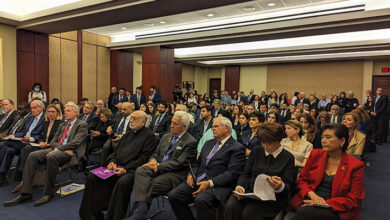
In today’s Grand Chamber judgment1 in the case of Sargsyan v. Azerbaijan, the European Court of Human Rights held, by a majority, that there had been:
a continuing violation of Article 1 of Protocol No. 1 (protection of property) to the European Convention on Human Rights;
a continuing violation of Article 8 (right to respect for private and family life) of the Convention; and
a continuing violation of Article 13 (right to an effective remedy).
The case concerned an Armenian refugee’s complaint that, after having been forced to flee from his home in the Shahumyan region of Azerbaijan in 1992 during the Armenian-Azerbaijani conflict over Nagorno-Karabakh, he had since been denied the right to return to his village and to have access to and use his property there.
In Mr Sargsyan’s case, the Court confirmed that, although the village from which he had to flee was located in a disputed area, Azerbaijan had jurisdiction over it.
The Court considered that while it was justified by safety considerations to refuse civilians access to the village, the State had a duty to take alternative measures in order to secure Mr Sargsyan’s rights as long as access to the property was not possible.
The fact that peace negotiations were ongoing did not free the Government from their duty to take other measures. What was called for was a property claims mechanism which would be easily accessible to allow Mr Sargsyan and others in his situation to have their property rights restored and to obtain compensation.
In today’s Grand Chamber judgment1 in the case of Chiragov and Others v. Armenia the European Court of Human Rights held, by a majority, that there had been:
a continuing violation of Article 1 of Protocol No. 1 (protection of property) to the European Convention on Human Rights;
a continuing violation of Article 8 (right to respect for private and family life) of the Convention; and
a continuing violation of Article 13 (right to an effective remedy).
The case concerned the complaints by six Azerbaijani refugees that they were unable to return to their homes and property in the district of Lachin, from where they had been forced to flee in 1992 during the Armenian-Azerbaijani conflict over Nagorno-Karabakh.
The Court considered that there was no justification for denying the applicants access to their property without providing them with compensation. The fact that peace negotiations were ongoing did not free the Government from their duty to take other measures.
What was called for was a property claims mechanism which would be easily accessible to allow the applicants and others in their situation to have their property rights restored and to obtain compensation.








